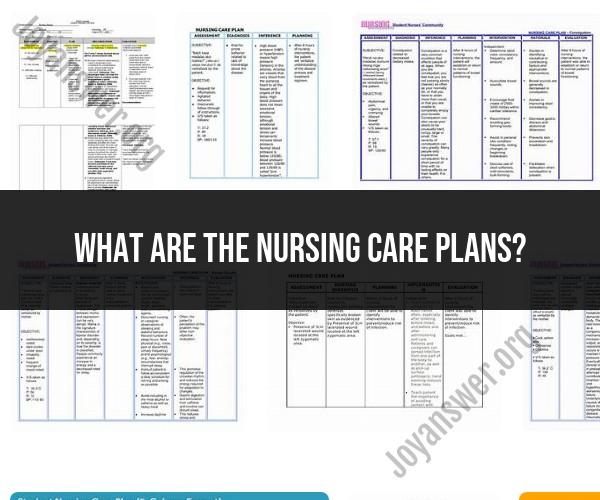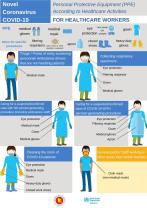What are the nursing care plans?
Nursing care plans are essential tools used by nurses to provide individualized and holistic care to patients. They serve as a comprehensive framework for the assessment, planning, implementation, and evaluation of patient care. A nursing care plan typically includes the following components:
Assessment: This is the initial step in creating a care plan. Nurses collect relevant data about the patient's medical history, current condition, vital signs, laboratory results, and the patient's own input about their health.
Diagnosis: Nurses use the assessment data to identify the patient's nursing diagnoses. Nursing diagnoses are distinct from medical diagnoses and focus on the patient's responses to their health condition. For example, a nursing diagnosis might be "Impaired Gas Exchange" for a patient with respiratory issues.
Planning: In this stage, the nurse collaborates with the patient and, often, the healthcare team to set goals and plan interventions. Goals should be specific, measurable, attainable, relevant, and time-bound (SMART). The plan outlines what actions will be taken to address the patient's needs and how the outcomes will be achieved.
Interventions: This section lists the nursing interventions or actions that will be carried out to meet the patient's goals. These actions can include things like medication administration, wound care, education, therapeutic communication, and more.
Evaluation: After the interventions have been implemented, the nurse assesses the patient's response to the care provided. If the goals have been met, the care plan may be modified, continued, or discontinued based on the patient's condition. If the goals have not been met, the nurse may revise the plan and interventions accordingly.
Nursing care plans are critical for several reasons:
- They provide a systematic and organized approach to patient care.
- They ensure that care is patient-centered and based on individual needs and responses.
- They help in effective communication and collaboration among healthcare providers.
- They serve as a guide for nurses to track and document patient care.
- They contribute to quality care, patient safety, and positive outcomes.
Nursing care plans are tailored to each patient's unique situation, whether in a hospital, long-term care facility, or home care setting. They are a fundamental part of nursing practice, promoting evidence-based and patient-focused care.
Nursing Care Plans: A Comprehensive Guide for Healthcare Professionals
Nursing care plans are essential tools for healthcare professionals. They provide a roadmap for individualized patient care, helping to ensure that all of the patient's needs are met in a coordinated and comprehensive manner.
Understanding the Purpose and Components of Nursing Care Plans
The purpose of nursing care plans is to:
- Identify and assess the patient's needs
- Develop goals and interventions to meet those needs
- Implement and evaluate the care plan
- Communicate the care plan to other healthcare professionals
Nursing care plans typically include the following components:
- Patient assessment: This includes gathering information about the patient's medical history, physical and mental health status, social and cultural background, and personal goals.
- Nursing diagnoses: These are statements about the patient's problems or risks.
- Goals: These are statements about what the patient wants to achieve or what the nurse wants to achieve for the patient.
- Interventions: These are actions that the nurse takes to help the patient achieve their goals.
- Evaluation: This is the process of assessing the patient's progress towards their goals and making adjustments to the care plan as needed.
Creating Tailored Care Plans for Individual Patients
No two patients are the same, so nursing care plans must be tailored to the individual needs of each patient. This involves taking into account the patient's medical condition, age, lifestyle, and personal preferences.
When developing a nursing care plan, it is important to involve the patient in the process. This helps to ensure that the plan is realistic and achievable, and that it meets the patient's individual needs and goals.
Implementing and Monitoring Nursing Interventions
Once a nursing care plan has been developed, it is important to implement the interventions as planned and to monitor the patient's progress closely. This may involve collecting data, assessing the patient's response to the interventions, and making adjustments to the care plan as needed.
It is also important to communicate the care plan to other healthcare professionals who are involved in the patient's care. This helps to ensure that everyone is working together to achieve the patient's goals.
The Ongoing Role of Nursing Care Plans in Patient Care
Nursing care plans are not static documents. They should be reviewed and updated regularly to reflect the patient's changing needs and progress. This helps to ensure that the patient is receiving the most appropriate and effective care possible.
Nursing care plans play an essential role in patient care. They help to ensure that all of the patient's needs are met in a coordinated and comprehensive manner. By developing and implementing tailored care plans, healthcare professionals can help their patients to achieve their health goals and to live their best lives.













